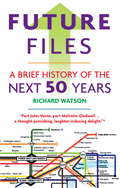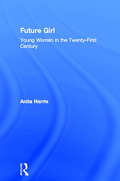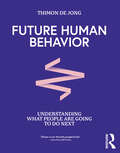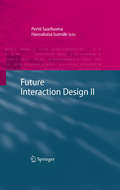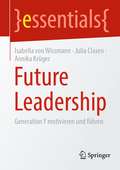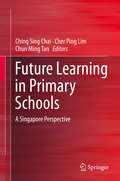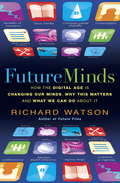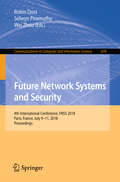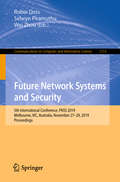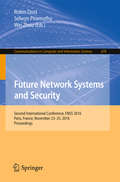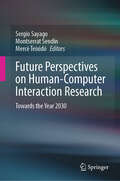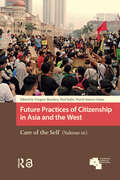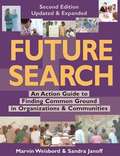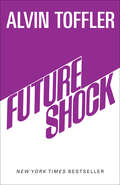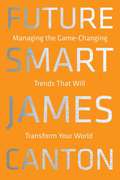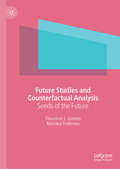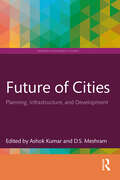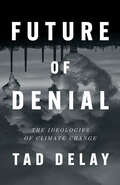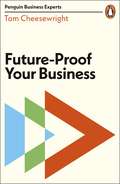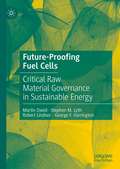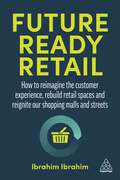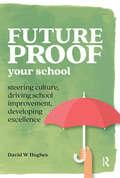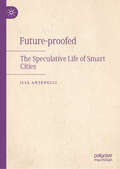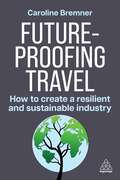- Table View
- List View
Future Files
by Richard WatsonFuture Files is filled with provocative forecasts about how the world might change in the next half century. It examines emerging trends and developments in society, technology, economy, and business, and makes educated speculations as to where they might take us.
Future Girl: Young Women in the Twenty-First Century
by Anita HarrisAnita Harris creates a realistic portrait of the "new girl" that has appeared in the twenty-first century--she may still play with Barbie, but she is also likely to play soccer or basketball, be assertive and may even be sexually aware, if not active. Building on this new definition, Harris explores the many key areas central to the lives of girls from a global perspective, such as girlspace, schools, work, aggression, sexuality and power.
Future Human Behavior: Understanding What People Are Going To Do Next
by Thimon De JongThe world continues to develop at an astonishing speed – socially and technologically. Human behavior is continually influenced by this ever-changing environment. Is it possible to predict what those new behaviors will be? And what are their implications for our future societies? Thimon de Jong’s Future Human Behavior is a unique and accessible examination of our thrilling, challenging and unpredictable world and how we respond, react and shape it. Using insightful and original examples aligned with pertinent analysis, the author takes the reader on a compelling journey through future behavioral dynamics. He engages with a wide variety of topics, from digitalisation to trust, from ethics to mental health. Future Human Behavior is your inspirational guide to a number of possible futures, and the book you need to be ready for them all.
Future Interaction Design II
by Pertti Saariluoma Hannakaisa IsomäkiThe perspectives and techniques used in human-computer interaction design, practice and research are broadening. This book looks at emerging approaches which are likely to contribute to the discipline in near future. The underlying idea is that human character rather than technology should determine the nature of interaction. The concept of "interaction design" covers this range of concerns relevant to enabling quality design. Each chapter emphasizes alternative perspectives on interaction and new concepts to help researchers and practitioners relate to alternative design approaches and opportunities. This second volume provides a wider perspective, from both a scientific and geographic outlook. New topics, such as psychological design processes, gerotechnology, modelling, e-learning and subconscious experiences are discussed from a team of international authors. This book will be of considerable value to those seeking innovative perspectives upon designing and ensuring effective interaction between humans and technology.
Future Leadership: Generation Y motivieren und führen (essentials)
by Julia Clasen Isabella von Wissmann Annika KrügerWie wollen Mitglieder der Generation Y geführt werden? Auf Basis wissenschaftlicher Erkenntnisse liefert dieses essential Führungskräften, Beratern und Coaches praktische Handlungsempfehlungen und effektive Methoden für die erfolgreiche Führung von Nachwuchskräften. Anhand von aktuellen Studien werden Bedürfnisse und Erwartungen der Ypsiloner an Führung identifiziert und Erfolgsfaktoren zur Führung dieser Generation abgeleitet. Im Überblick werden drei zentrale Methoden agiler Führung vorgestellt: Scrum, Design Thinking und OKR. Resümierend können Ansätze des agilen Managements zur effektiven Führung von Mitarbeitern der Generation Y als erfolgversprechend bewertet werden.
Future Learning in Primary Schools
by Ching Sing Chai Cher Ping Lim Chun Ming TanThis edited book tells the story of the multifaceted efforts devoted by a "future school" in Singapore--The Nan Chiau Primary School--in shaping future learning. It documents the various measures implemented by one primary school to improve student learning outcomes in a technology-rich teaching and learning environment. With the current interest in Singapore's "Masterplan for ICT (information and communication technology) in Education," and the increasing focus on teaching and learning design by leading education researchers and professionals, this well-timed book will appeal to policy makers, educators and researchers.
Future Minds
by Richard WatsonDrawing on the latest research, this book looks at the ways that screen culture is shaping the future and changing the way we think. Future Minds asks: are we becoming addicted to data and how do we go about starting a digital diet, urgently? You'll find thought-provoking and practical suggestions about reclaiming the space and time to think deeply.
Future Network Systems and Security: 4th International Conference, FNSS 2018, Paris, France, July 9–11, 2018, Proceedings (Communications in Computer and Information Science #878)
by Selwyn Piramuthu Robin Doss Wei ZhouThis book constitutes the refereed proceedings of the 4th International Conference on Future Network Systems and Security, FNSS 2018, held in Paris, France, in July 2018.The 14 full papers and two short papers presented were carefully reviewed and selected from 39 submissions. The papers are organized in topical sections on secure design and verication; security, privacy and ethics; big data and applications of future network systems.
Future Network Systems and Security: 5th International Conference, FNSS 2019, Melbourne, VIC, Australia, November 27–29, 2019, Proceedings (Communications in Computer and Information Science #1113)
by Selwyn Piramuthu Robin Doss Wei ZhouThis book constitutes the refereed proceedings of the 5th International Conference on Future Network Systems and Security, FNSS 2019, held in Melbourne, Australia, in November 2019. The 16 full papers and two short papers presented were carefully reviewed and selected from 38 submissions. The papers are organized in topical sections onemerging networks and applications; security, privacy and trust; and security analytics and forensics
Future Network Systems and Security: Second International Conference, FNSS 2016, Paris, France, November 23-25, 2016, Proceedings (Communications in Computer and Information Science #670)
by Robin Doss, Selwyn Piramuthu and Wei ZhouThis book constitutes the refereed proceedings of the Second International Conference on Future Network Systems and Security, FNSS 2016, held in Paris, France, in November 2016.The 12 full papers and one short paper presented were carefully reviewed and selected from 34 submissions. The papers focus on the technology, communications, systems and security aspects of relevance to the network of the future.
Future Perspectives on Human-Computer Interaction Research: Towards the Year 2030
by Sergio Sayago Montserrat Sendín Mercè TeixidóThis edited book provides some future perspectives on Human-Computer Interaction research and serves as a crucial nexus for reflecting on the paths that have led us here. Technologies are increasingly becoming active agents capable of learning, adapting, and making decisions. The classic User-Centred Design approach that positions the user strictly at the centre may no longer suffice. Putting the human-in-the-loop are crucial elements for trusting AI technologies and building better, more human-centred, ones. Offering a comprehensive overview of current research and future directions in this field it addresses important topics such as Human-Centred Artificial Intelligence, Augmented and Virtual Reality, User-Centred Design, and Children-Computer Interaction, providing insights into how these areas will continue to influence and transform our interaction with technologies. The chapters are enriched with case studies and examples that illustrate the practical application of methodological approaches and ideas.
Future Practices of Citizenship in Asia and the West: Care of the Self (Volume III) (Asian Cities)
by Gregory Bracken Paul Rabé Nurul Azreen AzlanFuture Practices of Citizenship in Asia and the West investigates some of the greatest challenges facing society in the twenty-first century, including the struggle for rights and recognition by indigenous peoples, women, migrants, and the young, as well as the dampening effects some government responses to COVID-19 have had on artistic freedom and citizen participation. The ill effects of digitisation on citizenship, however, are tempered by some more positive approaches from grass-roots activities. Perhaps the most acute challenge facing the world today is climate change, an issue that can be both positive and negative, depending on how we respond to it. All the papers in this book share a people-centred approach based around Michel Foucault’s Care of the Self.
Future Search: An Action Guide to Finding Common Ground in Organizations & Communities
by Marvin Weisbord Sandra JanoffWhen the term ''future search'' appeared in Productive Workplaces (Weisbord, 1987), so many people sparked to it that we decided, after trying fancier names like ''strategic futures conference,'' to retain it. The response to the concept led to Discovering Common Ground (Weisbord et al, 1992), a work that pulled together principles and practices for value-based action planning. The earlier book presented a variety of high participation models and cases, most based on the Emery/Trist Search Conference, including early experiments with future search. In this book we focus on our evolving future search model. Here we go deeply into our sources and rationale, our experiments with tasks and techniques, and examples of how we and many colleagues have employed this model and its variations. We also provide a philosophical rationale for our design and facilitation practices. -amazon.com
Future Shock
by Alvin TofflerDescription of the world's response to change and how it affects our lives.
Future Shock
by Alvin TofflerNEW YORK TIMES BESTSELLER • The classic work that predicted the anxieties of a world upended by rapidly emerging technologies—and now provides a road map to solving many of our most pressing crises. &“Explosive . . . brilliantly formulated.&” —The Wall Street Journal Future Shock is the classic that changed our view of tomorrow. Its startling insights into accelerating change led a president to ask his advisers for a special report, inspired composers to write symphonies and rock music, gave a powerful new concept to social science, and added a phrase to our language. Published in over fifty countries, Future Shock is the most important study of change and adaptation in our time. In many ways, Future Shock is about the present. It is about what is happening today to people and groups who are overwhelmed by change. Change affects our products, communities, organizations—even our patterns of friendship and love. But Future Shock also illuminates the world of tomorrow by exploding countless clichés about today. It vividly describes the emerging global civilization: the rise of new businesses, subcultures, lifestyles, and human relationships—all of them temporary. Future Shock will intrigue, provoke, frighten, encourage, and, above all, change everyone who reads it.
Future Smart: Managing the Game-Changing Trends that Will Transform Your World
by James CantonGame-changing trends are coming in business, technology, workforce, economy, security, and environment. Climate change, energy demand, and population growth will redefine global risk and power. Exponential new technologies will emerge in digital money, mobile commerce, and big data. An explosive new middle class of over one billion consumers will enter the marketplace. Every nation, job, business, and person will be transformed. To thrive in this future you have to become predictive, adaptive, and agile--to become Future Smart. Dr. James Canton, a renowned global futurist and visionary business advisor, illuminates the pivotal forces and global power shifts that everyone must understand today to thrive in a rapidly changing landscape: Regenerative medicine will extend our lifetimes and rebuild our bodies Robots and drones will drive our cars, teach our kids, and fight our wars Smart machines will design, manage, and service 40% of all global businesses--energy, commerce, finance, and manufacturing--without humans Digital consumers who live always connected will challenge every business to change its strategy Climate change wars will redefine security and resources Most of us are not prepared to meet the challenges the future will bring, but these changes are coming fast. Armed with knowledge, those who are Future Smart can take action to reinvent themselves, their businesses, and their world.
Future Studies and Counterfactual Analysis: Seeds of the Future
by Theodore J. Gordon Mariana TodorovaIn this volume, the authors contribute to futures research by placing the counterfactual question in the future tense. They explore the possible outcomes of future, and consider how future decisions are turning points that may produce different global outcomes. This book focuses on a dozen or so intractable issues that span politics, religion, and technology, each addressed in individual chapters. Until now, most scenarios written by futurists have been built on cause and effect narratives or depended on numerical models derived from historical relationships. In contrast, many of the scenarios written for this book are point descriptions of future discontinuities, a form allows more thought-provoking presentations. Ultimately, this book demonstrates that counterfactual thinking and point scenarios of discontinuities are new, groundbreaking tools for futurists.
Future of Cities: Planning, Infrastructure, and Development (Towards Sustainable Futures)
by Ashok Kumar D. S. MeshramThis book critically analyses the existing condition of cities in developing countries with special reference to planning and infrastructure networks in India. It provides an overview of the nature of opportunities presented by cities; major challenges that cities would face in future; and codifies the ways and means to transcend the challenges of contemporary urban growth and quality of urbanisation. It discusses key themes such as architecture of density, transformation of land-use zones to development zones, development of railway infrastructure, planning and design guidelines for bus rapid transit, and urban water planning and universal access to housing to create an enabling environment for deliberations and a better future for cities in the developing world. The book integrates insights from governance, planning, and design and highlights implications of spatial integration. It brings together current issues in Indian urbanisation, smart technologies used in building smart cities and high-rises, and urban and regional governance to explore forms of sustainable development planning that factor human needs. Accessible and topical, this book will be useful to scholars and researchers of urban studies, urban and city planning, development studies, sociology, public policy and administration, political sociology, anthropology, architecture, geography, and economics, as well as to professionals, planners, policymakers, and non-governmental organisations.
Future of Denial: The Ideologies of Climate Change
by Tad DeLay"Tad DeLay is one of the most important and disquieting theorists of consciousness and politics writing today. His work is indispensable."—China Miéville, author of OctoberCapitalism is an ecocidal engine constantly regenerating climate change denialThe age of denial is over, we are told. Yet emissions continue to rise while gimmicks, graft, and green- washing distract the public from the climate violence suffered by the vulnerable. This timely, interdisciplinary contribution to the environmental humanities draws on the latest climatology, the first shoots of an energy transition, critical theory, Earth&’s paleoclimate history, and trends in border violence to answer the most pressing question of our age: Why do we continue to squander the short time we have left?The symptoms suggest society&’s inability to adjust is profound. Near Portland, militias incapable of accepting that the world is warming respond to a wildfire by hunting for imaginary left-wing arsonists. Europe erects nets in the Aegean Sea to capture migrants fleeing drought and war. An airline claims to be carbon neutral thanks to bogus cheap offsets. Drone strikes hit people living along the aridity line. Yes, Exxon knew as early as the 1970s, but the fundamental physics of carbon dioxide warming the Earth was already understood before the American Civil War.Will capitalists ever voluntarily walk away from hundreds of trillions of dollars in fossil fuels unless they are forced to do so? And, if not, who will apply the necessary pressure?
Future-Proof Your Business (Penguin Business Experts Series)
by Tom CheesewrightIt has never been more important for business leaders to look to the future. Yet, when we are living through some of the most uncertain times we have ever faced, it can feel daunting to know where to start. In Future-Proof Your Business, applied futurist Tom Cheesewright will reveal industry techniques and tools to help you: - Scan the near horizon for incoming shocks- Look to the far future to define long-term strategy- Accelerate decision-making in your business- Delegate power to the front line, speeding your response- Streamline your organisation so it's agile and can adapt to changeIn our uncertain times, leaders who keep their focus on the future will be the ones who prevail.
Future-Proofing Fuel Cells: Critical Raw Material Governance in Sustainable Energy
by Robert Lindner Martin David Stephen M. Lyth George F. HarringtonAs the world accelerates towards a renewable energy transition, the demand for critical raw materials (CRMs) for energy generation, conversion, and storage technologies is seeing a drastic increase. Such materials are not only subject to limited supply and extreme price volatility but can also represent serious burdens to the environment, to human health, and also to socio-political systems. Taking an interdisciplinary perspective, this book provides a novel perspective on the discussion about material dependencies of energy technologies. It examines CRMs use in fuel cells, an emerging energy conversion technology, and discusses governance strategies for early-stage fuel cell development to predict and avoid potential issues. This will be an invaluable resource for researchers in energy studies, engineering, sociology and political science as well as those with a general interest in this field looking for an accessible overview.
Future-Ready Retail: How to Reimagine the Customer Experience, Rebuild Retail Spaces and Reignite our Shopping Malls and Streets
by Ibrahim IbrahimTraditional shops are facing challenging and unprecedented times. Future-Ready Retail explains how changing consumer needs, the impact of digital and the issues around health, wellness and distancing have transformed retail and provides compelling solutions to help reimagine the high street and out-of-town malls. Conventional high streets, shopping arcades and retail malls throughout the world no longer attract the crowds needed to sustain them as successful commercial spaces. Suffering from the effects of online shopping, changing consumer attitudes and expectations, and the legacy impact of social distancing, there's a sense of urgency and the need to address the decline in physical retail. Future-Ready Retail provides in-depth analysis of how consumers, health, data and new technologies will continue irreversibly to shake up physical shops and permanently shape the future of traditional retail. Arguing that to be future-ready, retail needs to be driven by people and places, not solely real estate, the book explains how brands can develop strategies to create shops whose main purpose is to recruit, retain and delight customers. Featuring case studies from successful global brand, retail futurist and designer Ibrahim Ibrahim identifies key retail-cultural trends, shows why it's important to make retail space physically smarter and how to use touch points such as social, website and apps alongside the physical space, to achieve a seamless, enjoyable and profitable retail experience.
Future-proof Your School: Steering culture, driving school improvement, developing excellence (Practical Teaching)
by David HughesWouldn’t it be great if you could equip your school and yourself to face whatever the future might throw at you!Schools face myriad calls on their time and creativity yet have finite internal resources to respond to them. This can result in piecemeal changes, and reactive rather than pro-active approaches. This book reduces, filters and prioritises the demands on staff energy to the central task of all schools - to achieve the best engagement of and learning outcomes for all learners (including the staff themselves).Schools often feel constrained by their current context, their previous performance, their demographics or available staff. This book provides an holistic and effective approach to change management that is simple, engages all stakeholders, is built around the current expertise and culture of the school and, most importantly, is sustainable.It is suitable for headteachers, senior or aspiring leaders, and those driving change through initiatives, but also individual teachers who are interested in effective practice as a route towards personal well-being and professional satisfaction.
Future-proofed: The Speculative Life of Smart Cities
by Ilia AntenucciEfficient, inclusive, sustainable: these are only some of the concepts through which smart cities have been marketed globally, over the past fifteen years at least. But what has really driven smart city projects, governance, and economies? This book argues it is speculation: not merely finance, but a much broader technopolitical force seeking to calculate and shape the future. Smart cities have been testbeds for new technological products, governed through preemptive analytics, and fuelled by high-risk financial investments. Drawing on case studies from Kolkata and Cape Town, this book illustrates how smart city technologies speculate on the future to govern and monetise the present. Today, smart cities might have lost some of their hype already, but their legacies are here to stay, and their ethical and political implications appear more critical than ever. This book offers insights into the speculative forces that undergird urban &‘smartness&’, and into their implications on everyday life, spatial justice, and citizens&’ rights.
Future-proofing Travel: How to Create a Resilient and Sustainable Industry
by Caroline BremnerEvolving traveller expectations, pressures to reduce emissions and a need to preserve popular destinations from over-tourism and climate change are creating untold disruption in the travel industry. The industry cannot continue to grow unchecked and wholesale transformation is required.Future-proofing Travel considers current travel trends in consumer expectations for greener and more experiential travel alongside the demands from local communities and industry-led initiatives to meet government pledges of lower emissions. It explores how business leaders in tourism and hospitality services must adapt their offerings to remain relevant in a competitive environment where sustainability and technology are no longer nice-to-haves. Explore data-driven and holistic solutions for travel industry professionals to transform their businesses to be more purposeful and sustainable with this book.While there is no one pathway to success, Future-proofing Travel shows how travel companies and destinations are currently adapting their practices to be more impact conscious while also elevating the traveller experience. Using real-world examples from leading brands such as Airbnb, Marriott, TUI and Intrepid Travel, this book maps out how travel brands and destinations can accelerate their positive actions through digitalization and green innovation to regenerate local communities, retain consumer loyalty and increase long-term profits sustainably into the future.
